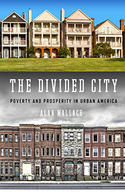For the past 125 years, Labor Day has been a time to celebrate the relevance, and political power, of the American working class. As recently as the 1990s, organized labor’s big day was an important milestone on the political calendar, particularly for Democrats. read more »
Newgeography.com - Economic, demographic, and political commentary about places
Around San Francisco’s New South of Market Transit Center
In the 1980s, the city of San Francisco experienced a strong reaction against continued development of its dense financial center skyscraper district north of Market Street. that the term Manhattanization was popularized by the alternative biweekly, San Francisco Bay Guardian, which channeled the interest of many residents to preserve both their neighborhood and the iconic, historic buildings in downtown San Francisco before they were replaced by new, taller structures. read more »
- Login to post comments
Where Salaries Go Furthest in 2019: The Small-City Advantage
Big cities are the engines of the modern economy. They offer workers a range of opportunities — and employers a range of workers, customers, and infrastructure — that smaller places generally can’t match. But when it comes to what many job seekers care about most, smaller cities often are best. In particular, for most jobs, salaries are higher in smaller places after accounting for the cost of living.
read more »
- Login to post comments
Decarbonization In Homes And Businesses At What Cost?
The California Public Utilities Commission’s (CPUC) plans to make all homes and businesses use electricity only means electricity will need to take up the duties that natural gas has been performing, and provide continuously uninterruptable power as California is on a path toward 100% renewables and “zero-carbon” sources in electricity by 2045. read more »
- Login to post comments
Indy’s Cost Effective Transit Improvement Plan Is a Model for Low Density Cities
My latest piece is online at CityLab. It’s a look at the transit improvement plans in Indianapolis as the city’s first Bus Rapid Transit line on September 1st. Indy’s system is a model for how lower density cities with auto-centric cultures can start making major improvements in their transit offerings in a capital efficient way. read more »
- Login to post comments
A Review of Alan Mallach's The Divided City
The astounding revival of American cities is real. However, the inequality evident in virtually all of them is real as well, and built into the system. Much of the urban discourse has centered on the former, but the latter has likely has a broader impact on contemporary metropolitan development nationwide. Inequality in American cities has three dimensions – spatial, economic and racial. The erosion of the middle class is a key feature of industrial city decline and most impacts older industrial cities. And of course, sweeping global and national trends are at work. read more »
- Login to post comments
Public Schools Should Be Places of Learning, Not Propaganda
California likes to think of itself as the brain center of the universe, but increasingly much of that intellectual content comes from somewhere else. Once a leader in educational innovation and performance, California is now toward the bottom of the pack. read more »
- Login to post comments
The World’s $86 Trillion Economy Visualized in One Chart
The world’s GDP still grew a healthy 6.9% in 2018, up from $80.2 trillion in 2017 to $85.8 trillion. Nearly half of this growth came from the world’s two largest economies: the United States, at $20.5 trillion (up 5.4% from 2017), and China, at $13.6 trillion (up 10%). However, fear of a global recession are mounting -- much of it related to growing economic tension between the two leading economies. read more »
- Login to post comments
Ridership Falls Another 2.9 Percent in June
June 2019 transit ridership was 2.9 percent lower than in June 2018, according to the Federal Transit Administration’s most recent data release. Ridership dropped in all major modes, including bus, commuter rail, heavy rail, and light rail. Ridership also dropped in 41 of the nation’s 50 largest urban areas, declining even in Seattle, which had previously appeared immune to the decline that is afflicting most of the nation’s transit industry. read more »
- Login to post comments
Australia's Long Suffering Commuters
Daily commute times are ballooning in Australia's largest capital cities (metropolitan areas, called Greater Capital City Statistical Areas). This is a finding of the latest Household, Income and Labour Dynamics in Australia (HILDA) Survey. The HILDA Survey is conducted across the nation by the University of Melbourne. read more »
- Login to post comments





















